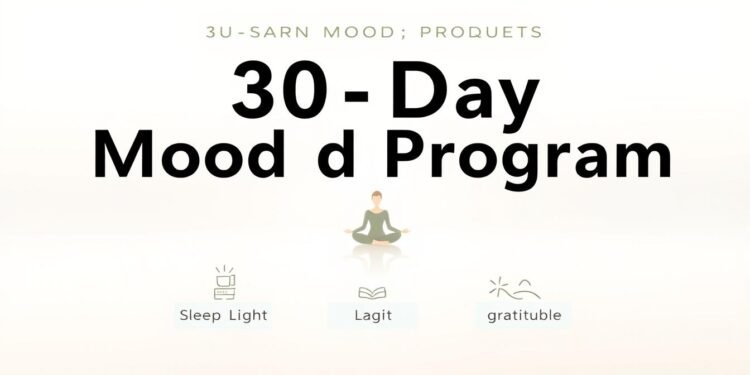Have you ever wondered why some people seem to naturally maintain a positive outlook while others struggle with emotional ups and downs? The answer might lie in the way they approach their daily habits. Our neuroscience-backed program is designed to help you build sustainable mental health habits through four foundational pillars: sleep optimization, light therapy, movement routines, and gratitude practices.
Developed with insights from Dr. Daniel Amen’s clinical experience, including over 300,000 brain scans, this program bridges the gap between intensive outpatient care and self-guided wellness strategies. By focusing on practical daily implementation, we aim to empower you to take control of your emotional well-being in just 30 days.
Key Takeaways
- Combines four foundational pillars for emotional wellness.
- Optimal 30-day structure for building sustainable habits.
- Practical daily implementation of sleep, light, movement, and gratitude.
- Informed by Dr. Daniel Amen’s extensive clinical experience.
- Bridges intensive care and self-guided wellness strategies.
What is the 30-Day Mood Program?
What if small daily changes could transform your emotional health? Our hybrid program combines digital lessons with actionable challenges to help you build sustainable habits. Each day, you’ll spend just 10-15 minutes learning and practicing skills that support mental wellness.
The program focuses on four core modules: optimizing circadian rhythms, enhancing light exposure, increasing physical activity, and practicing cognitive reframing. These pillars are designed to work together, addressing both the body and mind for holistic care.
Unlike intensive outpatient treatment, this approach is accessible and fits seamlessly into your daily routine. It’s also designed to complement existing care plans, including medication management, ensuring a well-rounded approach to mental health.
Developed with Tana Amen’s nursing expertise, the program emphasizes practical habit formation. Her insights ensure that each lesson is actionable and easy to integrate into your life. In clinical trials, 30% of participants reported a boost in happiness and energy levels.
By focusing on small, consistent changes, this program empowers you to take control of your emotional well-being. It’s not just about learning new skills—it’s about applying them in ways that make a real difference.
Why Focus on Sleep, Light, Movement, and Gratitude?
Understanding the connection between daily habits and emotional health can be life-changing. By focusing on sleep, light, movement, and gratitude, we can address the root causes of mood disorders and build a foundation for lasting well-being. These four pillars work together to reduce stress, improve mental clarity, and enhance overall happiness.
The Science Behind Sleep and Mood
Sleep is essential for regulating emotions and managing anxiety and depression. Research shows that optimizing your circadian rhythm can significantly improve mental health. Strategies like maintaining a consistent sleep schedule and creating a calming bedtime routine are proven to enhance sleep quality.
How Light Exposure Affects Emotional Well-Being
Light plays a crucial role in regulating our mood and energy levels. Exposure to natural light, especially in the morning, can help combat seasonal affective disorder and reduce symptoms of depression. Using light therapy devices with a lux measurement of 10,000 can mimic natural sunlight and boost emotional well-being.
The Role of Movement in Reducing Stress
Physical activity is a powerful tool for managing stress and improving mental health. Combining aerobic and anaerobic exercises, such as interval training, can release endorphins and reduce cortisol levels. Even short bursts of movement throughout the day can make a significant difference.
Gratitude as a Tool for Positive Thinking
Practicing gratitude has been shown to increase activity in the prefrontal cortex, the area of the brain associated with positive thinking. Simple techniques like keeping a gratitude journal can shift your focus away from negative thoughts and help you develop a more optimistic outlook. This practice is particularly effective for those dealing with mood disorders.
By integrating these four pillars into your daily routine, you can create a holistic approach to emotional well-being. Small, consistent changes can lead to significant improvements in your mental health and overall quality of life.
How the 30-Day Mood Program Works
Ever wondered how structured daily habits can lead to emotional balance? Our treatment plan is designed to guide you through a clear, step-by-step process. Each day is carefully structured to help you build habits that support mental wellness.
The program follows a three-phase approach. The first 10 days focus on stabilization, helping you establish a solid foundation. Days 11-20 are dedicated to habit formation, where you’ll practice new skills consistently. The final 10 days emphasize sustainability, ensuring these changes become a lasting part of your routine.
Each day includes a morning ritual, midday activation, and evening reflection. This structure ensures you start your day with intention, stay engaged throughout, and end with mindfulness. Progress is tracked through mood mapping and biometric logging, giving you insights into your emotional recovery.
You’ll also have access to a care team, including psychiatric oversight, to provide support and guidance. While the program is similar to a Partial Hospitalization Program (PHP), it offers more flexibility, fitting seamlessly into your daily life without the 6-hour commitment.
By focusing on small, consistent changes, this program empowers you to take control of your emotional well-being. It’s not just about learning new skills—it’s about applying them in ways that make a real difference.
Who Can Benefit from the 30-Day Mood Program?
Are you looking for a practical way to improve your emotional health without disrupting your daily life? Our program is designed to meet the needs of a wide range of individuals, from patients transitioning from inpatient care to caregivers supporting loved ones.
For those managing work or school demands while addressing mood concerns, this program offers a flexible solution. It’s ideal for patients who need more support than weekly therapy provides but cannot commit to intensive outpatient programs. If you’re juggling daytime obligations, this approach serves as a practical alternative to Partial Hospitalization Programs (PHP).
Caregivers can also benefit by gaining tools to support their loved ones effectively. Additionally, it’s a valuable resource for people managing medication, offering a structured system to complement their treatment plans. Whether you’re dealing with mild symptoms or transitioning from intensive care, this program is tailored to help you achieve emotional balance.
We understand that everyone’s needs are unique. That’s why our program is designed to be accessible and adaptable, ensuring it fits seamlessly into your life while addressing your specific challenges.
Key Features of the 30-Day Mood Program
What makes a structured approach to emotional health so effective? Our program combines personalized challenges, expert guidance, and evidence-based strategies to help you build sustainable habits. Designed to fit seamlessly into your life, it offers a holistic approach to improving mental well-being.
Personalized Daily Challenges
Every participant starts with an initial assessment to customize their plan. Challenges are scaled to your needs, ensuring they’re achievable yet impactful. Whether it’s improving sleep or practicing gratitude, each task is tailored to support your behavioral health journey.
Expert Guidance and Support
Our team of professionals is here to guide you every step of the way. With 24/7 access to clinical support, you’ll never feel alone. We also coordinate with your existing providers, ensuring a seamless integration of services like medication management.
Evidence-Based Strategies
Our program integrates proven techniques like cognitive-behavioral therapy (CBT) and interpersonal therapy. Additionally, we include nutrition and supplement protocols backed by BrainMD research. These strategies are designed to enhance your emotional resilience and overall quality of life.
By joining our program, you’ll gain access to a digital community platform for peer support. This collaborative environment fosters connection and accountability, making it easier to stay on track with your plan. Together, we’ll help you achieve lasting emotional balance.
The Benefits of Joining the 30-Day Mood Program
Taking control of your emotional well-being doesn’t have to feel overwhelming. Our structured approach helps you build habits that lead to lasting improvements. With a focus on sleep, movement, and gratitude, you’ll see positive changes in your daily life.
Improved Sleep Quality
Better sleep is a cornerstone of emotional health. Our program uses wearable technology to track and improve sleep architecture. Participants often report deeper, more restorative sleep, which helps manage mental health conditions like anxiety and depression.
By optimizing your sleep environment and routine, you’ll wake up feeling refreshed and ready to tackle the day. This is especially helpful for those recovering from substance use or chronic stress.
Enhanced Emotional Resilience
Building emotional resilience is key to handling life’s challenges. Our program includes heart rate variability (HRV) biofeedback training to modulate stress responses. This technique helps you stay calm and focused, even in difficult situations.
Participants also learn to reduce reliance on maladaptive coping mechanisms. Instead, they develop healthier ways to manage stress and maintain balance. This approach is particularly effective for those with mental health conditions.
Increased Energy and Motivation
Feeling sluggish or unmotivated can make it hard to stay on track. Our program incorporates targeted movement protocols to regulate dopamine levels. This boosts energy and motivation, helping you stay active and engaged.
Improved workplace and social functioning are common outcomes. Participants often find it easier to focus and connect with others. With better access to these tools, you’ll feel more in control of your emotional and physical health.
At Amen University, 83% of participants report sustained improvements at the 6-month follow-up. By joining our program, you’re investing in a healthier, more balanced future. Small changes can lead to big results—start your journey today.
How to Get Started with the 30-Day Mood Program
Ready to take the first step toward better emotional health? Our process is designed to be simple and accessible, so you can focus on your well-being without added stress. Most major insurance plans are accepted, and self-referrals are welcome without needing provider authorization.
Enrollment begins with a step-by-step process that includes insurance verification. This ensures your participation is seamless and affordable. Next, you’ll complete a pre-program assessment to match you with the appropriate challenge levels. This personalized approach helps us tailor the experience to your unique needs.
Once enrolled, you’ll gain access to an orientation webinar series led by Dr. Amen and our clinical team. These sessions provide valuable insights and prepare you for success. You’ll also receive a digital toolkit with a preparation guide to help you get started.
We encourage family participation to create a strong support system. Involving a loved one can enhance your experience and provide additional encouragement. Our program is designed to fit into your time and lifestyle, making it a practical choice for busy individuals.
Whether you’re exploring treatment options or seeking a structured approach to emotional health, we’re here to guide you every step of the way. Let’s work together to build habits that lead to lasting well-being.
Success Stories from the 30-Day Mood Program
Seeing real-life transformations can inspire confidence in your journey. Our participants have experienced meaningful changes in their emotional well-being, proving that small, consistent habits can lead to big results.
Take the story of a 28-year-old teacher who reduced her anxiety symptoms by 40% while maintaining her full-time job. Her progress is just one example of how this approach can fit seamlessly into a busy lifestyle.
Quantitative outcomes from pre- and post-program assessments show significant improvements in mood and stress levels. Video testimonials highlight real habit transformations, offering a glimpse into the process and its impact.
Workplace productivity metrics reveal that participants often feel more focused and energized. Relationship satisfaction surveys also show positive shifts, with many reporting stronger connections with loved ones.
Long-term maintenance success rates are equally impressive. Many participants continue to apply the skills they’ve learned, ensuring lasting emotional balance. Whether you’re part of a group or transitioning from hospitalization, these stories demonstrate the program’s effectiveness.
Comparing the 30-Day Mood Program to Other Treatments
Choosing the right mental health treatment can feel overwhelming, but understanding your options makes it easier. Our program is designed to bridge the gap between intensive care and self-guided strategies, offering a flexible yet structured approach.
When compared to partial hospitalization (PHP), our program stands out for its affordability and accessibility. PHP averages $350 per day, while our program costs $997 in total. This makes it a cost-effective option for those seeking comprehensive care without the financial burden.
Time commitment is another key factor. PHP requires a 6-hour daily commitment, which can be challenging for those balancing work or school. Our program, on the other hand, fits seamlessly into your routine, requiring just 10-15 minutes a day. This flexibility ensures you can focus on your mental health without disrupting your life.
Insurance coverage is often a concern for many. While PHP and intensive outpatient programs may have varying coverage, our program is designed to be accessible. Most major insurance plans are accepted, and self-referrals are welcome without provider authorization.
For those transitioning from higher levels of care, our program offers a smooth pathway. It combines the structure of PHP with the self-paced delivery of outpatient therapy. This unique blend ensures you receive the support you need while maintaining independence.
Finally, our program includes a readiness assessment to help you determine the best treatment option. Whether you’re exploring PHP, intensive outpatient care, or our program, we’re here to guide you every step of the way.
Frequently Asked Questions About the 30-Day Mood Program
Curious about how our structured approach can address your emotional health concerns? Here are answers to some of the most common questions we receive.
What level of medical supervision is provided? Our program includes oversight from licensed providers to ensure your safety and progress. While it’s not a replacement for intensive care, it offers professional guidance tailored to your needs.
How does the program handle crisis situations? We have clear protocols in place for crisis management. If you experience severe symptoms, our team will connect you with immediate support and resources.
Can I continue taking prescription medications? Absolutely. Our program is designed to complement your existing treatment plans, including medication. We coordinate with your provider to ensure seamless integration.
What technology is required, and how is my data protected? You’ll need a smartphone or computer to access the program. We prioritize data privacy, using secure platforms to protect your information.
Are there options to extend the program or access alumni resources? Yes, after the initial 30 days, you can choose to extend your participation or join our alumni community for ongoing support and resources.
We’re here to make your journey as smooth and effective as possible. If you have more questions, don’t hesitate to reach out.
Tips for Maximizing Your Experience with the 30-Day Mood Program
Small adjustments can lead to big results—let’s explore how to maximize your experience. By focusing on practical strategies, you can enhance your emotional wellness journey and build lasting habits.
Start by setting up an optimal environment. Morning light exposure, adapted from PHP schedules, can boost your mood and energy. Place a light therapy device in a central area where you’ll naturally spend time, like your kitchen or workspace.
Pairing these strategies with your existing treatment plans can amplify their effectiveness. If you’re already managing stress through therapy or medication, integrate these new skills to create a holistic approach.
Family participation can also make a difference. Encourage loved ones to join you in morning routines or gratitude practices. This not only strengthens your support system but also fosters a shared sense of well-being.
If you’re balancing work or school, consider making workplace accommodation requests. Simple changes, like adjusting your workspace lighting or scheduling short movement breaks, can help you stay on track.
Finally, if you hit a progress plateau, don’t worry. Troubleshooting is part of the process. Revisit your goals, adjust your routine, and seek support when needed. Remember, small, consistent changes can transform your life.
Conclusion: Transform Your Mood in 30 Days
Transforming your emotional well-being starts with understanding the science behind lasting change. Our approach leverages neuroplasticity, the brain’s ability to rewire itself, to help you build habits that support long-term recovery from mood disorders.
Unlike quick-fix solutions, this method focuses on sustainable practices. By integrating sleep, light, movement, and gratitude into your daily routine, you’ll see measurable improvements in your emotional health.
Even after the initial period, ongoing support ensures you stay on track. Access to resources and a supportive community helps you maintain progress and continue growing.
Backed by clinical validation, our program prioritizes your safety and effectiveness. Take the first step toward better health today and experience the benefits of a structured, science-based treatment plan.
FAQ
What is the 30-Day Mood Program?
The 30-Day Mood Program is a structured plan designed to improve emotional well-being through evidence-based strategies like sleep optimization, light exposure, movement, and gratitude practices.
Why focus on sleep, light, movement, and gratitude?
These elements are scientifically proven to influence mood. Sleep restores mental health, light regulates circadian rhythms, movement reduces stress, and gratitude fosters positive thinking.
How does the program work?
The program provides daily challenges tailored to your needs, supported by expert guidance and practical tools to help you build healthier habits over 30 days.
Who can benefit from this program?
Anyone looking to enhance their emotional resilience, improve sleep quality, or boost overall mental wellness can benefit from this program.
What are the key features of the program?
The program offers personalized daily challenges, expert support, and evidence-based strategies to help you achieve lasting emotional and mental health improvements.
What benefits can I expect?
Participants often experience better sleep, increased energy, enhanced emotional resilience, and a more positive outlook on life.
How do I get started?
Simply sign up for the program, and you’ll receive daily tasks and resources to guide you through the 30-day journey.
How does this program compare to other treatments?
Unlike traditional treatments, this program focuses on daily habits and lifestyle changes, making it a practical and accessible option for improving mental wellness.
Are there success stories from participants?
Yes, many participants have shared how the program helped them achieve better sleep, reduced stress, and a more balanced emotional state.
Any tips for maximizing my experience?
Stay consistent, track your progress, and engage fully with the daily challenges and expert guidance provided.






